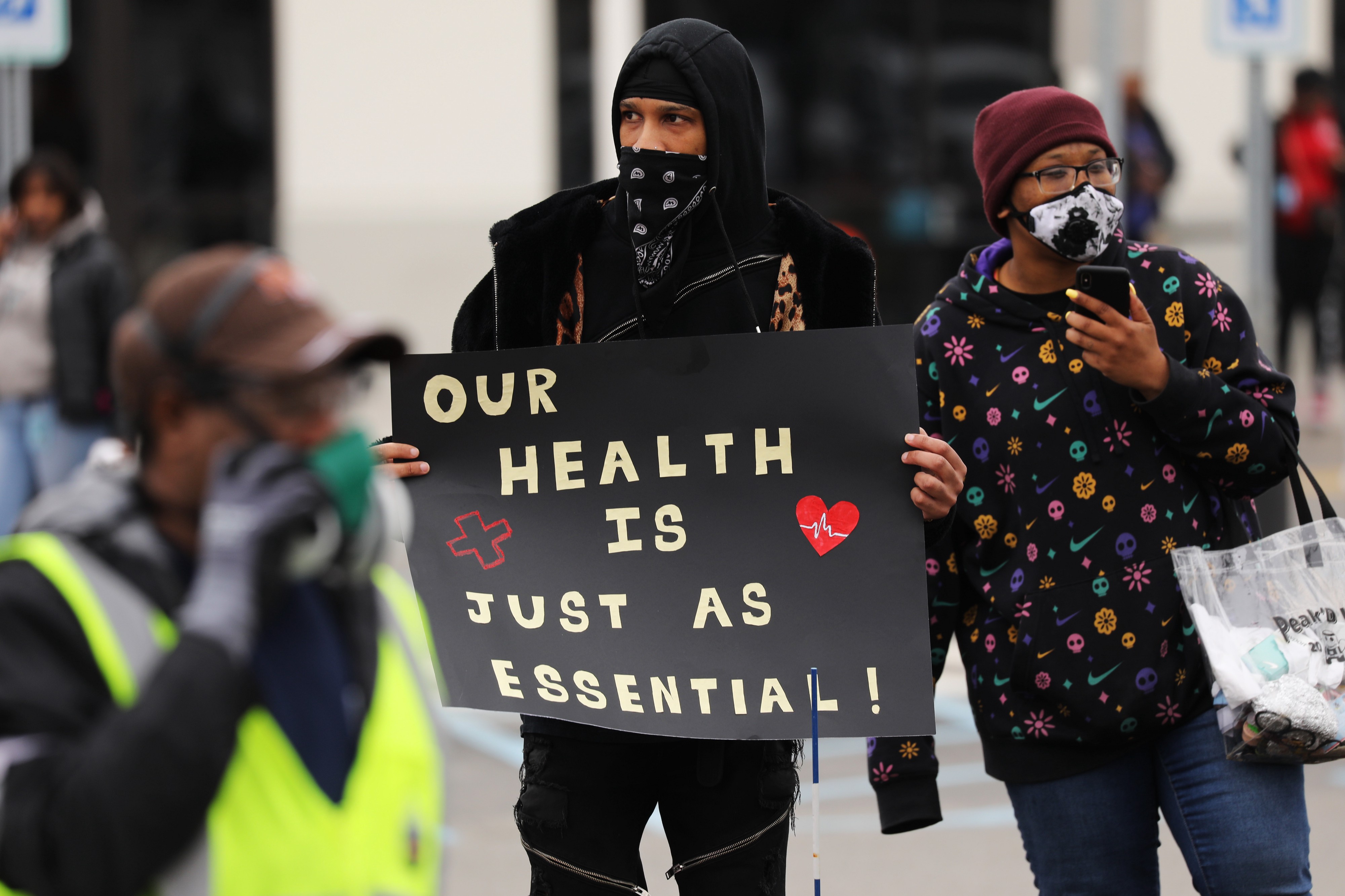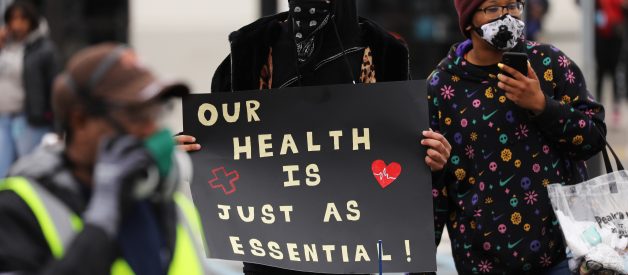For more information on the novel coronavirus and Covid-19, visit cdc.gov.
It?s clearer than ever that supporting Amazon is a tacit endorsement of abusive work policies and more
 Amazon employees hold a protest and walkout over conditions at the company?s Staten Island distribution facility on March 30, 2020 in New York City. Photo: Spencer Platt/Getty Images
Amazon employees hold a protest and walkout over conditions at the company?s Staten Island distribution facility on March 30, 2020 in New York City. Photo: Spencer Platt/Getty Images
Most corporate slogans do not double as the actual key to a company?s success, but Amazon?s does ? the online retailer?s dedication to being ?Earth?s most customer-centric company? has been the main driver of its explosive growth. Between Alexa, predictive shopping, one-click ordering, and two-day shipping, Amazon has engineered a user experience so intuitive that it has transcended ?convenience? and sent us onto whatever plane ? cyborg consumption? ? we?re on now. In the process, it has entirely overridden our standard-issue moral compass.
Amazon has treated its workers brutally, bullied competitors, dodged taxes, and generally been a bad civic actor. Unlike its fellow tech giants, Amazon has never been very interested in casting itself as a benevolent, doing-no-evil, world-connecting, different-thinking force for good. Its gambit has always seemed to be to lodge its user-friendly services into the middle of our lives so totally that we shoppers would tolerate or ignore its obvious failings, or at least convince ourselves that its transgressions amounted to a gray area. It has thus fed an endless debate about whether it?s ethical to patronize such a large and complicated and ubiquitous platform. So far, that gambit has paid off. We?ve kept loading items into our carts as warehouse worker deaths, abuses of monopoly power, and climate-heating deals with the oil industry have continued to mount. Amazon?s seamless fusion of e-commerce into our lives has helped obscure its long list of serious ethical lapses that has grown steadily over the decades.
As such, Amazon?s actions during the coronavirus crisis should be a wake-up call. Crises are good at laying bare the values of our institutions, after all ? they not only offer a fresh test of the intent and moral strength of the companies and services that populate our lives, they give us a blank slate on which we can measure their conduct. And Amazon has failed this test more dramatically than any other company has since the pandemic began.
Amazon has tried to maximize profit at the expense of its own workers? safety, skimping disastrously on workplace protections and paid time off.
Amid mass fear, shelter in place orders, and national panic, Amazon received a massive surge in orders, and its stock hit record highs. The newly $1.1 trillion-valued company, run by the richest man on the planet, had an opportunity to demonstrate that it could carry out its essential services ethically and safely with regard to the hundreds of thousands of people it employs. It could easily have chosen to offer robust sick pay policies for its workers right off the bat, proactively taken steps to ensure its employees were kept safe, and even reaped the positive press gained by positioning itself as heroic.
Instead, Amazon has tried to maximize profit at the expense of its own workers? safety, skimping disastrously on workplace protections and paid time off. It has repeatedly left its workers ? who are placing themselves at serious personal risk to ensure goods are shipped to millions of people in quarantine ? exposed to the virus, without informing them of known risks, when it could easily have used its vast internal communications architecture to keep everyone alert. It has also exploited the chaos sown by the crisis, ramming through unpopular decisions that hurt its vendors, small businesses, and workers. And, to top it off, Amazon has openly retaliated against those employees who dared call on the company to do better by firing them. So instead of reaching out to its own vulnerable workers, it has fought them tooth and nail, all to ensure it does not have to spend a dollar more on them than it absolutely must during a deadly global health crisis. It has been sickening to watch, but Amazon has offered us a portrait, in vivid color, of the company it has been all along.
Amazon Is at War With Its Workers
A surge of protests has demanded safer conditions during the coronavirus pandemic. But will they make a difference?
onezero.medium.com
For every protective measure Amazon did institute, it had to be pushed, called out, and protested by its own workforce. It was not until the coronavirus crisis was officially declared a pandemic on March 11 that Amazon even instituted a two-week paid sick leave policy for all workers who tested positive for Covid-19. Tests are notoriously hard to come by, making it difficult for workers to access the benefit ? and Amazon left many workers unaware of how to actually apply for the time off or determine eligibility anyway, omitting the information from employee portals and internal communications. Previously, on March 9, Amazon announced that in light of the virus, warehouse workers were free to take time off without the usual fear of being fired, but it would all be unpaid. Before that, there was no such guarantee. And, worse still, beginning on May 1, when the pandemic will still be in full swing, workers will no longer be eligible for unlimited unpaid time off; they?ll have to formally request leave if they feel unsafe, and prove that they are either at higher risk because of an immunodeficiency or live with someone who is. Everyone else will have to report to work or risk losing their jobs.
Paid sick leave doesn?t address the fact that Amazon took few preventative measures to protect workers who still showed up for their shifts. In mid-March, warehouse employees were still forced to file into a packed room for a morning meeting and into a crowded dining hall for lunch. Later in the month, Amazon continued to keep its workers in the dark as to the actual conditions at the warehouses they were working in, failing to inform them when Covid-19 cases were detected, neglecting to hire additional cleaning crews, and delaying the implementation of distancing or other protective measures. As a result, infections spread through Amazon facilities, and deaths are now being reported. Employees were forced to stage protests and walkouts.
This is not just disturbing: It?s pathetic.
In response, Amazon fired the organizer of one of the protests in New York, claiming he violated its social distancing policy. When three tech workers organized an event in support of the workers and shared a petition internally, Amazon fired them, too. Then it fired another worker for organizing in Minnesota.
Instead of demonstrating that it is indeed concerned for the well-being of its workforce, Amazon is ruthlessly silencing the worried voices, and hoping that everyone is too preoccupied to notice or care to take the side of the workers. In a leaked memo, Amazon executives discussed their plans to smear Chris Smalls, the organizer of the New York walkout, who is African-American, as ?not smart or articulate.?
This is not just disturbing: It?s pathetic. In a time of crisis, when people are banding together in solidarity to weather a common storm ? and a time when Amazon is doing brisker business than ever ? the company is waging war against its own employees. This is what we should remember about Amazon whenever the pandemic recedes: It punished concerned workers for trying to support each other, it left them exposed to a deadly virus, and it withheld easily provided crucial support ? all in the name of maximizing the efficiency of its operation for the benefit of its executives. This is what Amazon does, in a microcosm.
Its misdeeds reach far beyond the warehouse. News broke last week that Amazon was using a data-driven heat map to predict when Whole Foods workers might try to organize to improve their conditions. Amazon could have been marshaling technology to protect workers; instead, it chose to use it in an attempt to crush their efforts to win protections. (It?s worth noting that John Mackey, Whole Foods? CEO, suggested his workers donate their sick days to colleagues that needed it as a matter of pandemic sick leave policy.) Also in the last two weeks, Amazon slashed rates for its affiliate links program, which allows people to earn a portion of the sale whenever they refer others to a product on Amazon ? many media outlets in particular rely on this income in their business models. Then, just last week, another story broke that Amazon was collecting data from third-party vendors and using it to launch products that would specifically compete with those sellers, effectively undercutting them on price to put them out of business. ?We shouldn?t be doing this,? one Amazon employee commented, per the Wall Street Journal.
We shouldn?t. We shouldn?t be doing any of this.
Amazon Has Gone From Neutral Platform to Cutthroat Competitor, Say Open Source Developers
For open-source developers, AWS has gone from a neutral platform to a cutthroat competitor
onezero.medium.com
This litany of terrible behavior during a national crisis joins an already lengthy pre-pandemic list of offenses, too. That list includes brutal conditions in its warehouses, where a worker can succumb to a heart attack and lay on the floor untreated for 20 minutes, ambulances are called on a biweekly basis, and injury and death are too frequent. It includes aggressive union-busting, and intense worker surveillance. It includes literally breaking their backs, and offering few real benefits and shoddy in-house health care to compensate.
The list also includes working with oil and gas companies to help them use A.I. and automation to accelerate fossil fuel extraction ? it includes speeding up climate change. And again, there?s its shameless tax-dodging: one study deemed Amazon ?the worst for aggressive tax avoidance? of all the major tech companies, keeping tens of billions of dollars in offshore havens and otherwise preventing it from entering public coffers.
It?s all just too much. This is a company that has shown us, time and again, that it is more than willing to engage in unethical behavior, to run dangerous workplaces that put its employees in mortal danger, to cut corners if it will boost revenues or help expand its reach. It is not hyperbole to say that people are dying in a crisis because of Amazon?s relentless drive to profit ? some already have.
We do not have to support this. We do not have to accept Amazon?s easy-to-use consumption engine as a given feature of modern society. There are ample alternatives, in most cases. (For those with mobility issues or specific needs in rural areas, sometimes Amazon may in fact be the only reasonable choice; these cases, however, will be a slim minority.) We can insist on supporting a distribution network that does not build its foundation with workers it makes to suffer so that the richest man in modern history can become even richer. Jeff Bezos? net worth, by the way, has increased by about $24 billion since the crisis began. We can instead support those workers as they join Instacart, Target, and Walmart workers to go on strike on May 1st, in protest of their parent corporations reaping record profits while failing to protect them ? and we should refuse to cross the picket line beyond just that day, and until Amazon issues serious and substantive reform.
I know it can feel helpless, or pointless, to refrain from using Amazon or its platform, and this is not a call for a boycott. This is just to say that the debate is over: by buying from Amazon, or by renewing your Prime membership, or shopping at Whole Foods, you are supporting an unethical enterprise. You are backing an institution that has, in a deadly crisis, prioritized enriching its executives at the expense of its workers? health and bodies. You are supporting an operation that is now poised to take over an even broader swath of the American and global economy when the pandemic finally fades, absorbing market share from closed local shops and shuttered businesses. You are supporting the Amazonification of the planet.
It can be ambiguous what ?supporting Amazon? even constitutes, as its web services division, AWS, supplies the architecture for much of the internet. But let?s not overcomplicate matters: You do not need to feel bad for using a website that unbeknownst to you, hosts its servers with Amazon. But we should be aware of what we are consciously supporting. And as long as Amazon is endangering workers, pushing them to the brink, refusing to pay them fairly, crushing their efforts to seek better lives for themselves, and worse ? it is unethical to willingly spend your money to help further grow this reckless and malfeasant organization?s power.
Crises provide inflection points for change ? we can use this one to rethink our relationship to the company that is exploiting disaster to further entrench itself in our lives, at unknowable cost to our peers. We can?t let its size and complexity lull us any longer. Crises produce shocks. Maybe this one will get through to us: There is no gray area here ? Amazon is bad for all of us.
Update: This piece has been updated to include context about upcoming Amazon worker demonstrations. It also previously stated Chris Smalls had been reinstated; he has not.


